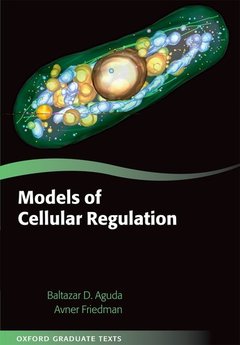Description
Models of Cellular Regulation
Oxford Graduate Texts Series
Authors: Aguda Baltazar, Friedman Avner, Visiting Associate Professor The Ohio State University
Language: English
Subject for Models of Cellular Regulation:
Approximative price 85.25 €
In Print (Delivery period: 21 days).
Add to cart
Models of cellular regulation (Oxford graduate texts) (Paper)
Publication date: 09-2012
194 p. · 17.3x24.5 cm · Hardback
Publication date: 09-2012
194 p. · 17.3x24.5 cm · Hardback
Approximative price 39.99 €
Subject to availability at the publisher.
Add to cart
Models of cellular regulation (harback) (series: oxford graduate texts)
Publication date: 07-2008
200 p. · 17.6x25.4 cm · Hardback
Publication date: 07-2008
200 p. · 17.6x25.4 cm · Hardback
Description
/li>Contents
/li>Biography
/li>
The human genome of three billion letters has been sequenced. So have the genomes of thousands of other organisms. With unprecedented resolution, modern technologies are allowing us to peek into the world of genes, biomolecules, and cells - and flooding us with data of immense complexity that we are just barely beginning to understand. A huge gap separates our knowledge of the components of a cell and what is known from our observations of its physiology. The authors have written this graduate textbook to explore what has been done to close this gap of understanding between the realms of molecules and biological processes. They have gathered together illustrative mechanisms and models of gene regulatory networks, DNA replication, the cell cycle, cell death, differentiation, cell senescence, and the abnormal state of cancer cells. The mechanisms are biomolecular in detail, and the models are mathematical in nature. The interdisciplinary presentation will be of interest to both biologists and mathematicians, and every discipline in between.
1. General Introduction. 2. From Molecules to a Living Cell. 3. Mathematical and Computational Modeling Tools. 4. Gene regulatory networks: from DNA to metabolites and back. 5. Control of DNA replication in a prokaryote. 6. The Eukaryotic Cell Cycle Engine. 7. Cell Cycle Control. 8. Cell Death. 9. Cell Differentiation. 10. Cell Aging and Renewal. 11. Multiscale Modeling of Cancer.
Baltazar Aguda is currently associate professor of Genetics & Genomics at the Boston University School of Medicine. He holds joint appointments in Biomedical Engineering, in the Bioinformatics & Systems Biology program at Boston University, and a membership in the Center for Biodynamics in the same university. Recently, he was appointed member of the National Science Foundation's (NSF, USA) research proposal review panel in molecular & cellular biosciences (2004-7). He was a visiting faculty at the Mathematical Biosciences Institute at Ohio State University (2003), at the Weizmann Institute of Science in Israel (2000), and a visiting associate at the California Institute of Technology (2000-2001). Dr. Aguda obtained his PhD in Chemistry (Chemical Physics Program) from the University of Alberta in Canada (1986), and was a tenured faculty member of the Department of Chemistry & Biochemistry at Laurentian University in Canada (1994-2002) before moving to Boston. Avner Friedman is a Distinguished Professor of Mathematics and Physical Sciences at the Ohio State University, where he also serves as the Director of the Mathematical Biosciences Institute. He received his Ph.D. degree in 1956 from the Hebrew University. He was Professor of Mathematics at Northwestern University (1962-1985), and a Duncan Distinguished Professor of Mathematics at Purdue University (1985-1987).
© 2024 LAVOISIER S.A.S.
These books may interest you

The Cell Biology of Stem Cells 158.24 €



